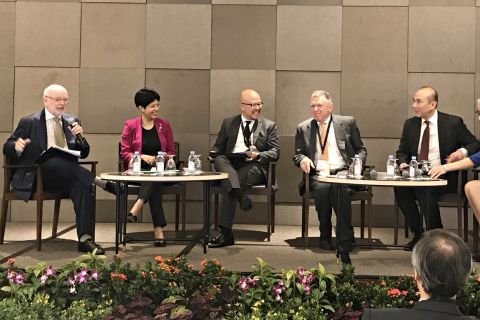
SMU Institutional Review Board – Prof Ferrin first shared examples of unethical research studies in the 1930s-1970s, which led to the establishment of the Belmont Report in 1978 and subsequent efforts worldwide to govern the conduct of human participant research. Then, he presented slides introducing the SMU IRB members, explained the roles of the IRB, and emphasized that having research protocols approved by the IRB is an “all-win”; a win for the research participants, the researchers, the institution, and science. Prof Ferrin then explained the requirements for IRB approval for collection of new data and use of existing data and publicly available data.
The Vice Provost (Research) and SMU IRB’s Institutional Official, Professor Steven Miller, who was present for the briefing, highlighted the need for researchers to understand that data that were made “publicly available” using unauthorized or illegal means should not be used. On this note, he said that researchers should refer to the University’s Data Loss and Leakage Prevention Policy to ensure the privacy and confidentiality of research data. He also commented that although students’ classroom projects do not need IRB approval, they still need to implement measures to inform and protect human participants, and also conform with national laws such as the Singapore Personal Data Protection Act for the collection, usage and disclosure of personal data.
Thereafter, Prof Ferrin described the IRB submission and review process, including the need to complete the Collaborative Institutional Training Initiative (CITI) program, the different IRB review categories, the IRB forms for completion, required elements of informed consent, and the core criteria for IRB approval. He highlighted that applicants are recommended to use the boilerplate participant information sheet and informed consent form, which includes standard wording that can be modified for conducting different types of research (i.e., Survey, Interview, Focus Group and Laboratory Experiment). Prof Ferrin also informed the audience that students can access the SMU IRB Intranet via OASIS.
Prof Ferrin then shared some IRB updates which included the following:
- the Association for the Accreditation of Human Research Protection Programs (AAHRPP) accreditation progress has led to changes in the IRB Handbook and application forms (visit the IRB Intranet for the IRB Handbook, IRB Application, Protocol Modification Request Form and Continuing Review Form dated 18 Sep 2017);
- the expansion of the “Exempt from Further IRB Review” category effective 1 October 2017 to include the following type of research:
- research involving the use of educational tests, survey/interview procedures or observation of public behaviour, in which the recorded information could identify the participants but disclosure of their responses outside the research could not reasonably place the participants at risk of criminal or civil liability or be damaging to the subjects' financial standing, employability, or reputation;
- the change to the Full Review process, specifically, from e-mail review approach to convened meeting approach;
- new SMU IRB initiatives such as satisfaction survey and Next-Day Review; and
- updates to the Singapore Personal Data Protection Act and the Human Biomedical Research Act (HBRA). Regarding the HBRA, Prof Ferrin mentioned that the Act will come into enforcement on 1 November 2017, and it is important for SMU researchers to be aware that if they conduct research that falls under the HBRA, they will need to collaborate with a Principal Investigator partner who will obtain IRB approval from an HBRA-compliant IRB.
Prof Ferrin also addressed some questions from the audience such as SMU IRB’s compliance measures, the review turnaround times, the period of IRB approval, the guidelines on data sharing, the requirement for protocol modification request submission, the definition of minor changes to research protocol, and the requirements of debriefing and data collection from students in class. He emphasized that researchers should feel free to contact the Secretariat or Chair/Deputy Chair anytime they have further questions. He ended by informing the audience that the SMU IRB will be implementing a Year-End Closing, in which the IRB will close for IRB submissions annually in the second half of December (15th-31st). During this period, the SMU Community are still welcomed to contact the SMU IRB at irb [at] smu.edu.sg if they have any questions or feedback on the IRB policies, procedures, forms, intranet, etc.
The next university-wide IRB briefing will be conducted in March 2018.
Back to Research@SMU Issue 47
See More News
Want to see more of SMU Research?
Sign up for Research@SMU e-newslettter to know more about our research and research-related events!
If you would like to remove yourself from all our mailing list, please visit https://eservices.smu.edu.sg/internet/DNC/Default.aspx

